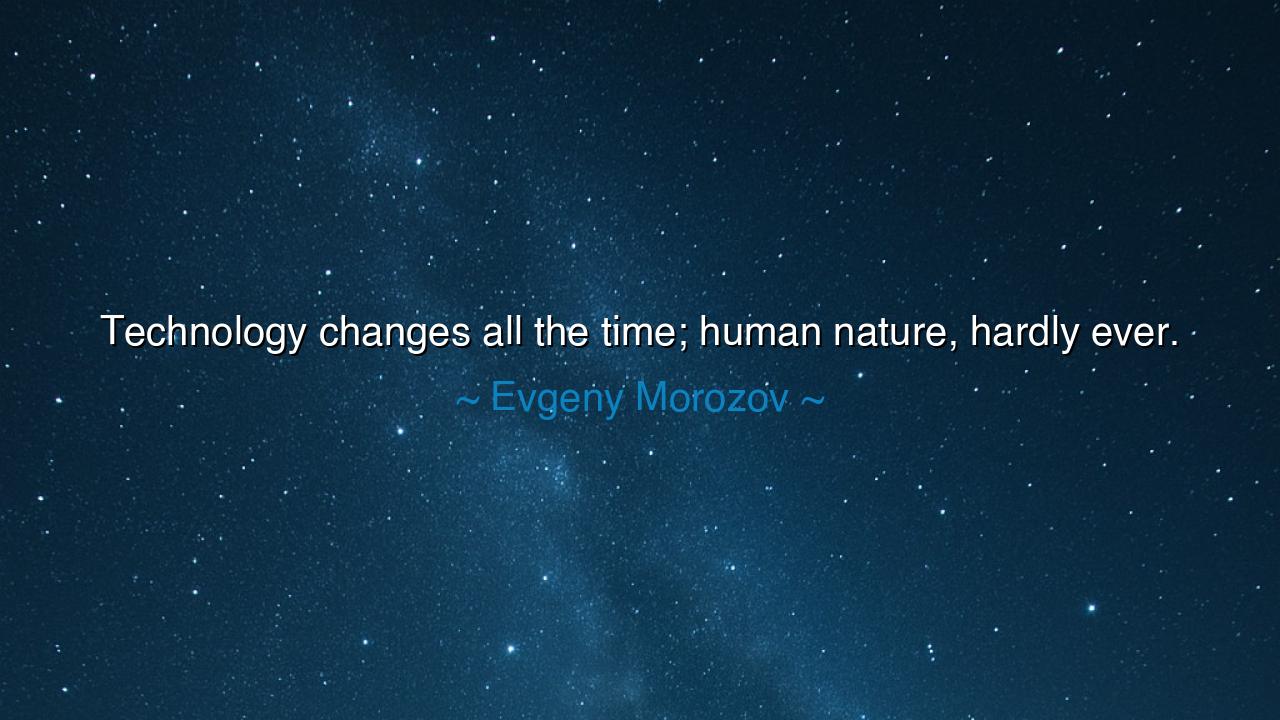
Technology changes all the time; human nature, hardly ever.






Evgeny Morozov speaks with the clarity of an ancient seer when he declares: “Technology changes all the time; human nature, hardly ever.” In these words, there lies a mirror held to the face of mankind. For though our tools evolve like the seasons, our hearts remain as they were in the time of kings and shepherds. The plow became the engine, the scroll became the screen, the torch became the electric flame—but the desires of man, the fears, the pride, the longing for love and power, remain unaltered.
The truth of this teaching is plain: technology is fluid, ever-shifting, like the tides of the sea. Each generation is born into new instruments of creation and destruction. Yet human nature is the bedrock beneath, unmoved by the crashing waves. In the days of Homer, men fought for honor and women wept for the return of their beloveds. Today, though we speak by glass screens and wage wars with drones, the reasons are much the same: ambition, greed, love, envy, hope. The costumes change, but the play remains eternal.
Consider the tale of the Trojan War, immortalized in song. Though no smartphones, no satellites, no digital networks existed, the passions that drove it were timeless: Helen’s beauty, Paris’ desire, Achilles’ rage, Odysseus’ cunning. Thousands perished not for lack of technology, but for the unchanging tempests of the human soul. Even if that war were fought today with missiles and machines, the heart of it would still be the same—a conflict born of pride, jealousy, and the hunger for glory. Thus Morozov’s wisdom reveals itself: the battlefield changes, but the combatants’ spirits remain unchanged.
Let us look too at a tale nearer our time: the rise of the atomic bomb. Science achieved what the ancients would have deemed godlike—the power to split the atom and summon suns upon the earth. Yet when this terrible technology was born, it did not rewrite human nature. Leaders grasped for it out of fear of rivals. Nations sought to wield it for dominance. And beneath the mushroom cloud lay the same human story told in Troy: the lust for power, the fear of defeat, the cruelty of war. The machine had changed, but the heart that directed it was the same heart that once drew bow and arrow.
This truth is both a warning and a light. A warning, because every advancement carries the shadow of human weakness. Without wisdom, new tools become sharper chains for old vices. The Internet may connect billions, but it also magnifies envy, greed, and deception. Social media may offer fellowship, but it feeds vanity and division. And yet, it is also a light: for knowing that our nature does not change, we may anchor ourselves in eternal virtues—justice, temperance, courage, compassion. These have been guides since the dawn of man, and they remain our compass in the storms of innovation.
Therefore, O children of the present age, do not be blinded by the dazzle of technology. It is a river that forever changes its course, but you are the mariner. Study the tools of your time, yes, but study also your own heart, for it is the true helm. Ask yourself: do I use this invention to heal or to harm, to uplift or to enslave? The nature of man has always hungered for mastery—but mastery of self is greater than mastery of machines.
The lesson is clear: embrace the shifting tide of technological change, but anchor yourself in the enduring truths of human nature. Be wary of pride, for it has destroyed kings. Guard against envy, for it has torn nations apart. And cultivate love, justice, and wisdom, for these alone can harness the gifts of progress. Let your tools be many, but let your heart be steadfast.
For in the end, Morozov’s words remind us of this eternal teaching: technology will always change, but man himself is the constant. The question is not what the next invention shall be, but what you shall do with it. And if your heart is wise, then even in an age of endless change, you shall walk the timeless path of virtue.






AAdministratorAdministrator
Welcome, honored guests. Please leave a comment, we will respond soon